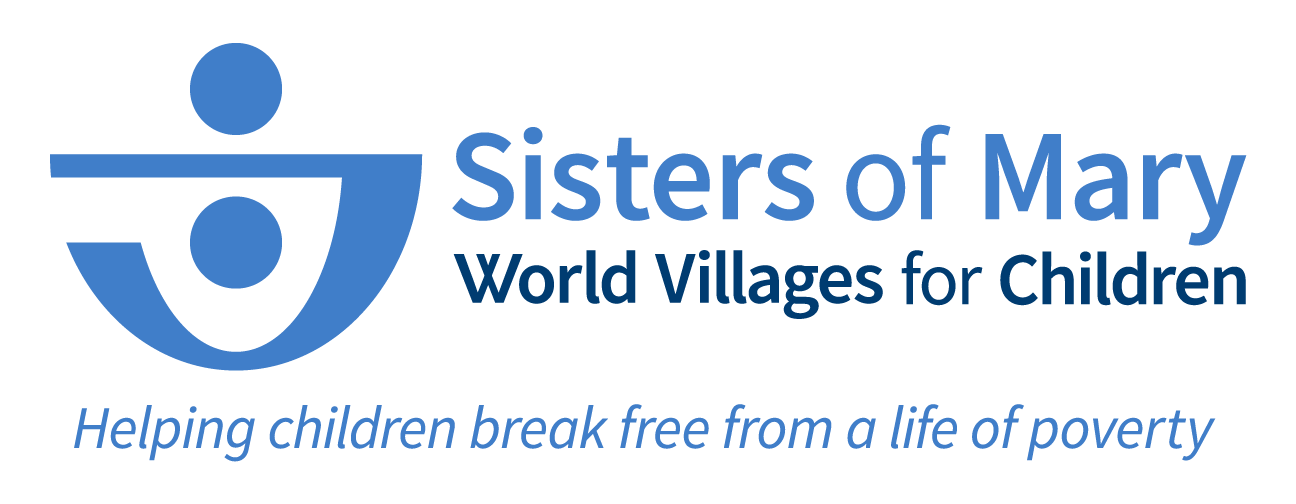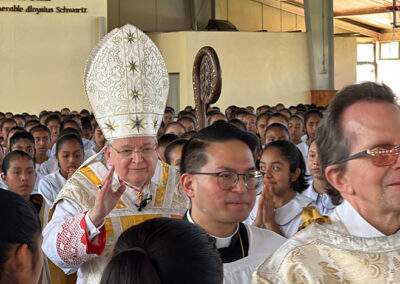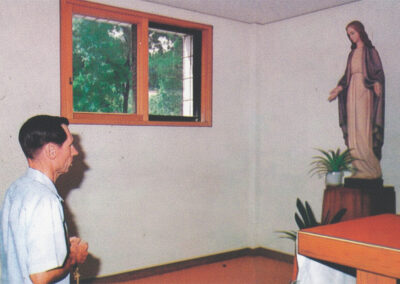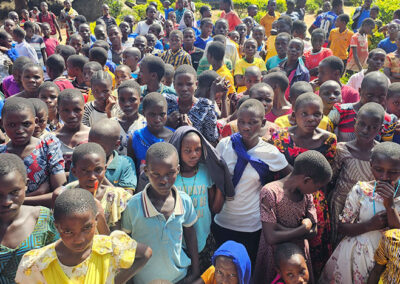The sister saw the boy approaching like a ghost emerging from a parched wilderness. He looked to be 11 or 12; his eyes were enormous and glazed over. The sister from the Sisters of Mary community knew these were the hunger eyes of the East African plains.
When she crouched down to meet the boy on his level, he stayed quiet. Then after some prompting, he quietly spoke.
“Are your parents with you,” the sister asked.
No, he whispered. (two of his father’s wives were dead; the third had left his home in 2022 to live with another man. His own father was 83, weak, and unable to make the trip to Dodoma, where the Sisters of Mary had just opened their small Boystown school on September 21st. It had not rained in more than five months in this part of Tanzania, one of its poorest regions.
“Where is your family?”
They are not here. (his younger brother, Emaueli – who he was close to – had recently disappeared after leaving the family’s lean-to in a small village called Chikopelo. Emanueli had gone without food for two days, so he sauntered off and never came back.
“Do you have identification?”
No. I have nothing. (to be admitted into the Boystown community, all students must have a form of identification).
What is your name?
Anthoni.
“Well, Anthoni,” said the sister with a smile. “Come with me.”

After being served a meal with tall glasses of water, Anthoni was taken for bloodwork. Because of his emaciated state, the sister thought he could be suffering the effects of AIDS or hepatitis.
She didn’t know that he hadn’t eaten in two days. The blood work revealed that Anthoni didn’t have Aids or hepatitis. In fact, the results revealed he didn’t have any sickness. He was merely starving to death.
Sr. Theresa Ladia, who is in charge of Dodama Boystown, said, “He came with nothing, not a single document. He looked very sad.”
By God’s providence, Anthoni had made it to the small Boystown community on the very day a few hundred boys, accompanied by their parents, came to seek admittance into the brand-new five-year school for Tanzania’s indignant. It was testing day.
How does a starving boy take a test with a clear mind and peace of soul – a short examination that will determine his fate and perhaps save his life? Here’s how: he remembers the commitment he made as a child when he walked two hours to school each morning before the break of day. He had prepared himself for this moment – for the short exam that would shape the remainder of his life.
He picked up the pencil, looked down at the piece of paper, and smiled. He thought he knew the answer to the first question. And the second. He began to write. …
And a few hours later, it was announced.
He had passed.
This mysterious boy was going to be one of the 110 students admitted into the first-ever Boystown class of Dodoma.

After the Sisters of Mary community located his father, they discovered the boy’s name was Anthoni Medaa Mayoka, who grew up in a nearby village. He was the fourth of eight siblings. Thereafter, the story of Dodoma’s mystery boy began to emerge.
“When I was in Grade 1, I stopped going to school for some months because I was sick,” he said. “After my circumcision, I was cured, but I could not continue and finish my studies because I missed many days at school. I could not read, so I repeated Grade 1. When I was in Grade 2, again I had to repeat because I was often chased away from school by my teacher because I didn’t have the school uniform, shoes, and books.”
Anthoni said without his father’s sacrifice and hard work, he wouldn’t have been able to purchase the school uniform and books that gave him a last chance at schooling. With the necessary clothes and school books, he began to make the long journey to school each day, where he thrived – despite often not eating until arriving home in the early evening.

Anthoni has been in the Sisters of Mary’s school for nearly a month now, where his entire physical appearance has changed. His smile is enormous and his body is beginning to fill out. He has become a prized pupil.
The new school in Dodoma is the thirteenth school of the Sisters of Mary, and its second in East Africa. The Sisters opened a school for girls in Kisarawe, near Dar es Salaam a few years ago.
Sr. Theresa said the first-ever class is a product of Our Lady’s intercession. “This school belongs to Mary,” she said, “The students who came here are chosen by Mama Mary herself. I personally believe this and tell this to all the children I care for.
“From the first day, we accepted the boys, praying the rosary is a must for everyone. So far, we have never had a problem with this, even with those non-Catholics (there are 29 Protestants and two Muslim boys in the 2023 class). I know we have no special powers to make the boys good. It is only through the intercession of Mary and God’s grace that will do that.”
As for Anthoni, Sr. Theresa said that his classmates have given him some gentle ribbing for how quickly he eats each meal.
“This boy,” she said. “He won the sympathy of the sisters from the very first day.”
Anthoni is already thinking about his future.
“When I grow up, I want to become a teacher, and I want to help other people. I am happy here with the Sisters of Mary,” he said. “When I arrived here, the sisters welcomed me joyfully, but I am thinking now of my father because now he is all alone. At home, nobody will fetch water for him anymore.
“But I will help my father, my younger brothers, and those who are also very poor.”
Anthoni knows the Sisters of Mary are equipping him now to change an entire generation of his family – and Anthoni said he is up to the task.
Note: World Villages for Children (WVC) is a non-profit organization that financially supports the Sisters of Mary as they help children break free from a life of poverty and trafficking and lead them to Christ. WVC provides food, shelter, clothing, medical expenses, Catholic education, and vocational training to more than 18,000 children in Boystowns and Girlstowns in six different countries around the world. To donate to the Sisters of Mary, please go to worldvillages.org/poverty.





